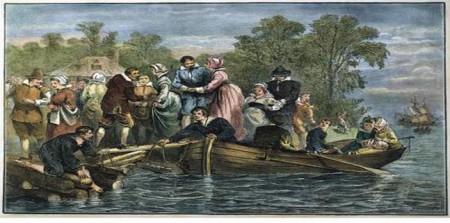
Chain gang convicts going to work near Sidney, Australia.
Prior to the seventeenth century, convicted criminals in Britain faced grim fates. Few went to prison—the Tower of London was reserved mostly for high class prisoners. Instead the courts relied on one of two options: physical punishment or death. And the latter option frequently held sway–there were 225 capital offenses on the books, including those for mild offenses like petty larceny.
But according to Peter Higginbotham in his fascinating book The Prison Cookbook, British officials hit upon a new solution for getting rid of their destitute and their convicted criminals. They sent them packing. King James I commuted the death penalty into transportation to the colonies. The 1597 Vagabonds Act allowed “rogues, vagabonds, and sturdie beggars” to be “banished out of this realme, and . . . conveied unto such parts beyond the seas.” (42) At first transport was voluntary. But soon it became fairly standard practice. The most common destinations were the American colonies in Virginia and Maryland. Convict wives were welcomed at the Jamestown Colony:

Female Convicts Transported From English Prisons Arriving In Jamestown, Virginia As Indentured Servants, Although Often Becoming Wives In Mass Weddings With The Male Settlers
Later on, western Australia was a popular destination.

Bill Thompson, a convict sent to Tasmania.
But in general, England’s creative solution was not quite so popular, particularly with the North American colonists. The convicts were usually sold to plantation owners as servants. In a letter to the Pennsylvania Gazette in 1751—thought to be written by Benjamin Franklin—the policy was deemed “an insult and contempt, the cruelest perhaps that ever one people offered another.”
By 1775, the colonists in North America had received as many as 30,000 convicts. In Britain, old ships were used to house even more convicts, and the conditions aboard the rusted old hulks moored on the Thames were abysmal. Diseases roared through the bulging ranks, frequently carrying off most of the wretched inhabitants of the floating prisons.
 Britain had to stop transporting convicts to the American colonies when the Revolutionary War began. In Britain, the big backlog of convicts was temporarily eased by allowing convicts who were eager to escape the hangman to enlist as soldiers.
Britain had to stop transporting convicts to the American colonies when the Revolutionary War began. In Britain, the big backlog of convicts was temporarily eased by allowing convicts who were eager to escape the hangman to enlist as soldiers.
On a side note–Georgia, the thirteenth colony, was founded by debtors. (In those days, people who could not pay their debt were thrown into prison. I did a post about debtors’ prisons here.) In 1732, a parliamentary committee selected 113 debtors and packed them off to Georgia, where they landed in 1733. It was thought to be a nice alternative to prison, and a place to begin anew.